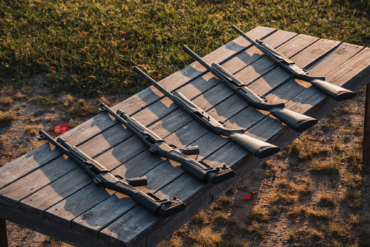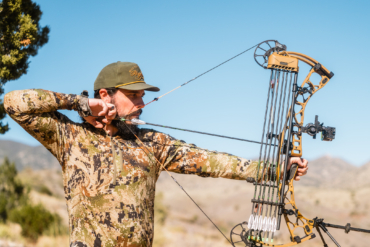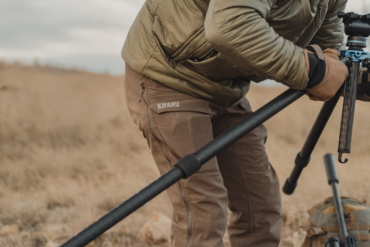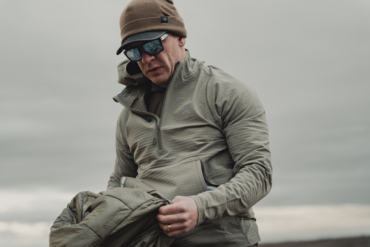It can be difficult to get into hunting as an adult, but it’s not impossible. If you want to start hunting, these tips will help you find your way afield.
Spring is the perfect time to prepare for the coming fall hunting season. And adults have been coming to hunting in droves during the past few years, with women coming to hunting as adults in higher numbers than ever before.
I marked my sixth year hunting in 2020, and it’s been a life-changing decision that puts great food on the table and widens my experience with the outdoors each year. I’ve hunted everything from geese to elk to mule deer. And I’m now in the process of raising and DIY training my first bird dog!
Warning: Once you put your own meat on the table, you might not want to quit. And, with that in mind, I’ve collected these tips to start hunting as well as resources that can help you guide your hunting education.
Editor’s note: This article was originally published in December 2019 and has been updated for spring 2021.
Hunters’ Education
Every state has a hunters’ ed program that’s usually legally required before hunting. It’s a great way to jump in, but much of basic hunters’ ed revolves around gun and hunter safety, which — although deeply important — doesn’t teach you much about hunting itself.
And it’s important to note that if you’ve aged out of hunters’ ed in your state, many states require hunters’ ed for all. So, if you plan on hunting, just take the time to complete the program. It’s worth it.
I also had a great experience in my bowhunters’ ed class. I think it’s valuable for every hunter to learn the tools around bowhunting, like shot placement, blood trailing, woodsmanship, and much more. If I had taken the class before my first rifle hunt, I would have had a much better base of knowledge and could have saved myself some mistakes.
Even if you’re not going to pick up a bow, you can learn a lot through the archery education program. I recommend taking both to anyone who might ask.
Currently, most states are offering all courses online in totality due to the pandemic. It’s a great time for busy folks to dive into both hunters’ and bowhunters’ education. If you can safely attend a field day, we highly recommend doing so.
Mentored, Guided Opportunities to Hunt
Hunt to Eat’s Hunt Camps
The brand Hunt to Eat offers a series of Learn to Hunt and Learn to Fish camps that encompass a variety of hunting methods, wild game and fishing options, and built-in mentorship in addition to opportunity.
These are guided camps that offer educational opportunities that include guest speakers, borrowed gear, conservation education, in-person how-to clinics, and, of course, the opportunity to bring meat home to your own freezer.
Finding a Quality Guide
A lot of folks start out hunting (and some only hunt) with professional, licensed guides. Although it’s often an expensive way to hunt, guides can help impart valuable skills for hunting different animals in different parts of the country.
If you’re looking for a guide who will be more accommodating as a teacher, it’s a good idea to have a conversation with your guide before the trip. Will they help you shoot or sight in your gun when you arrive? Are they open to helping you understand why animals are where they are? Do they offer meat hunts, as in non-trophy animal opportunities?
The brand GoHunt has a great searchable feature for Western hunting guides. But a bit of research on your part can help you hone in on the right guide for you.
State-Sponsored Programs
Before dropping a bunch of money on guides, be sure to call your local fish and game department to see what mentored opportunities might exist for adults. Programs like Becoming an Outdoors-Woman are gaining popularity.
And occasionally, states offer mentored opportunities for adults in conjunction with nonprofits for folks to learn how to get started in the field.
Reading List for New Hunters
‘The Complete Guide to Hunting, Butchering, and Cooking Wild Game’ (Vol. 1 & 2)
I recommend the rest of Steve Rinella’s books, really. But the guides are so insanely thorough and great that they’re both worth having on hand.
Both books are field guides for the active hunter. I keep mine in my rig, and I’ve used the guides on multiple occasions, like field dressing a deer or better understanding the wind. If you’re interested in hunting in general, this is a great place to start.
‘The Sioux Chef’s Indigenous Kitchen’
I’ve followed Sean Sherman for a long time, and I love this beautiful book that teaches readers about the ancient and important food heritage the American landscape holds.
The combination of foraging and wild game meats that make up both story and recipe is phenomenal. The book won a James Beard Award, and it continues to be one of the coolest cookbooks I’ve owned. Dig in and create a new way of looking at the flora and fauna around you.
Hank Shaw’s Cookbooks
Shaw is a master of detail when it comes to cooking and game. His book “Buck, Buck, Moose” has specifically helped me so much in understanding big game in new ways.
‘Call of the Mild: Learning to Hunt My Own Dinner’
There aren’t a ton of women writing on hunting, but Lily Raff McCaulou’s transformation in Oregon is one that I identify with. For anyone coming from a city background and wondering how they might fit in, this is a great read.
‘The Best of Outside: The First 20 Years’
A collection of writing via Outside Magazine? That’s weird. But when I still lived in the concrete pillars of downtown Denver, I read the opening essay, “The Heart of the Game” by Tom McGuane, and it gave me a new understanding of what hunting can be.
You can read the essay here, but you should also have the book on your shelf, as the writing by Edward Abbey, Annie Proulx, and more is just awesome.
Online Tips and Other Resources
Hunt Talk
This forum is moderated by one of my favorite educators in the hunting arena: Randy Newberg. It’s also chock full of passionate hunters willing to share their experiences and expertise on how to start hunting. These guys helped me a lot before I found my hunting crew.
MeatEater Processing Episode: Season 5, Episode 6
This show breaks down the realities of hunting. If the crew doesn’t take an animal, the show reflects it. If something goes wrong, the show reflects it. And when a tag is notched, amazing food happens.
But the most important episode is 22 minutes of Steve breaking down a deer. It’s super helpful and available on Netflix.
All Those Dang Podcasts
From Randy’s own Hunt Talk podcast to Mark Kenyon’s Wired to Hunt, Steven Rinella and the MeatEater crew, and Joe Rogan bringing the topic to the forefront so often on his expansive podcast, hunting has a wide array of voices talking through so much within the pursuit.
Find your favorite, download it, laugh a lot, and learn a lot. Dig in.
Joining Backcountry Hunters & Anglers
I met my hunting partners through volunteering for BHA in Bozeman, Montana. BHA has chapters all around the country, full of people who welcome new hunters and curious people with open arms.
It’s a great community and for $25 per year, you can get connected to local sportsmen and sportswomen in your community. And, to be honest, $25 per year to meet hunting partners is way, way cheaper than hiring a guide. Get after it.
Figure Out Your Hunting Gear

Wear what you’ve got. I killed my first deer in yoga pants, trail-running shoes, and a J.Crew jacket. Camo is helpful, but the technical camo of today is expensive and out of reach for a lot of people just getting into it.
Stick to the rules of staying warm and dry, just like you would on a hike. Avoid bright clothes if possible, but don’t feel like clothing is your first buy.
Borrow gear if you can. If you jump into hunting communities, there are wonderful people out there who can lend you the gear necessary for the type of hunt you choose to take on.
Don’t forget pawn shops. You can get really nice rifles, bows, and shotguns at bargain deals at pawn shops, among other great equipment. Talk with the shop crew; there’s often someone in-house that knows their stuff when it comes to guns.
Spend money where it counts. Boots that are comfortable and fit well are tough to get secondhand. But sale racks can often hold great deals. If you have to spend big money on any one item, make it your boots. You’ll never regret good footwear.
Merino wool is a great place to invest some cash as you build a more technical wardrobe. I really like First Lite base layers for both men and women.
How to Start Hunting: Final Thoughts
Being a first-time hunter doesn’t have to feel completely overwhelming. There’s a plethora of information beyond what I’ve shared.
Do your research, figure out what gear you’ll need for your pursuit, and, if you can’t find a mentor, go out on your own. The adventure of hunting awaits.








